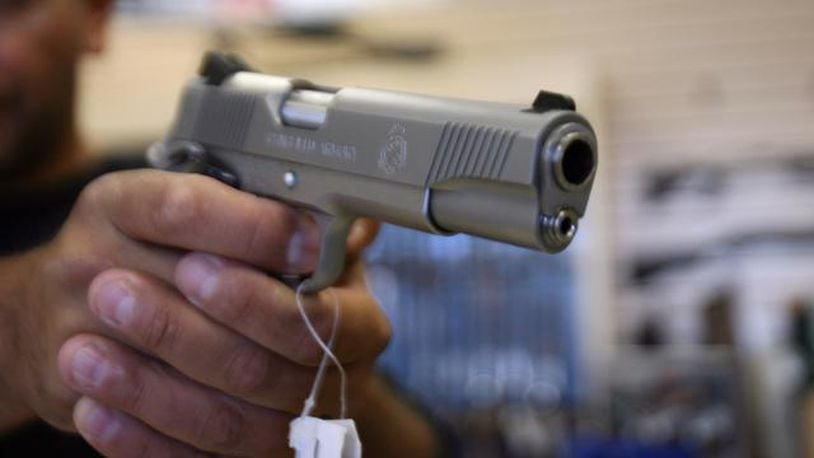“I’ve made it pretty clear that we need to see action on other areas as well,” DeWine told this newspaper. “So I don’t know whether I’d sign that bill or not. I don’t know what the bill is going to look like. There continues to be discussions about changes in the bill.”
The governor declined to say whether he is negotiating with lawmakers to adopt portions of his Strong Ohio gun reform plan in exchange for his support for expanding other gun rights. “Legislative strategy is not exactly something I talk about publicly,” DeWine said.
Under current law, gun owners have a “duty to retreat” from danger in public places before they use deadly force in self-defense. House Bill 796 and Senate Bill 383 would each remove that duty. The change has been long on the wish-list for gun rights groups in Ohio.
“If you honestly believe you are about to die, it is cruel and absurd to expect you to attempt escape, delaying your own self-defense and putting your life in even greater danger. Ohio’s Duty to Retreat law is an injustice to victims of crime and an outrageous legal requirement,” said Dean Rieck, director of Buckeye Firearms Association, in written testimony favoring SB383.
Senate Bill 383 cleared a legislative committee last week and could receive a floor vote anytime. House Bill 796, which is sponsored by state Rep. Kyle Koehler, R-Springfield, may receive a committee vote on Wednesday. House legislative leaders are also considering folding the idea into another gun bill that already cleared the Senate.
Koehler has said, “My right to defend myself from serious bodily harm or death should be extended to anywhere I am lawfully allowed to be.”
Lawmakers are rushing to complete all legislative business before the end of December when the two-year session ends. Any bills that don’t receive final approval will die and need to be re-introduced next year.
Two years ago during a lame duck legislative session, lawmakers voted to override then Gov. John Kasich’s veto of a gun rights bill.
Whaley backed DeWine’s effort to pass gun reforms in the wake of the Oregon District mass shooting in August 2019. DeWine’s proposal called for improving information uploaded for background checks, creating a voluntary background check system for private gun sales, expanding the use of 72-hour mental health hospital holds to include those with substance abuse and alcoholism, and adopting stiffer penalties for gun crimes.
That bill is not expected to pass this legislative session.
“What is says is the state legislature is not focused on normal people’s lives. It says the state legislature is out of touch with what’s going on in our communities and really out of touch on what’s happened in our communities this last year,” Whaley said.
Here’s a look at some significant changes to Ohio’s gun laws over the years:
1859: Ohio bans carrying concealed weapons.
2004: Ohio enacted its first concealed carry weapons permitting system.
2006: Lawmakers approve a bill to pre-empt local jurisdictions from having their own firearms laws. The new law expands the CCW program.
2008: Ohio passes a law expanding the right to use deadly force to defend a home or vehicle. Signed by Gov. Ted Strickland, it is heralded by the NRA as the most sweeping gun rights bill adopted in any state in a decade.
2011: Gov. John Kasich signs into law a measure that allows CCW permitholders to carry guns into bars, restaurants, shopping malls, museums and other places.
2012: Kasich signs another CCW bill into law that allows gun owners to keep firearms in their vehicles in parking facilities.
2014: Kasich signs into law the use of noise suppressors while hunting, a reduction in CCW required training hours from 12 to eight hours and an expansion of reciprocity of CCW permits with other states. The new law removes semi-automatic weapons that fire 31 or more cartridges without re-loading from the list of highly regulated dangerous ordnances.
2016: Kasich signs into law a measure to allow CCW permitholders to carry weapons on college campuses, in day care centers, inside public areas of airports and elsewhere. The new law also blocks businesses or property owners from barring CCW permitholders from keeping their firearms in their vehicles.
2018: Following the mass shooting in Parkland, Florida, Kasich changes his position and backs measures to enhance background checks, prohibit bump stocks, red flag laws and more.
2018: State lawmakers step away from a “stand your ground” bill. Instead, the law shifted the burden of proof to prosecutors in self-defense cases, aligning Ohio with 49 other states. Kasich vetoed the measure but lawmakers overrode the veto.
2019: Following a mass shooting in Dayton, Gov. Mike DeWine advocates a 17-point plan for gun restrictions and increased mental health services.
About the Author
